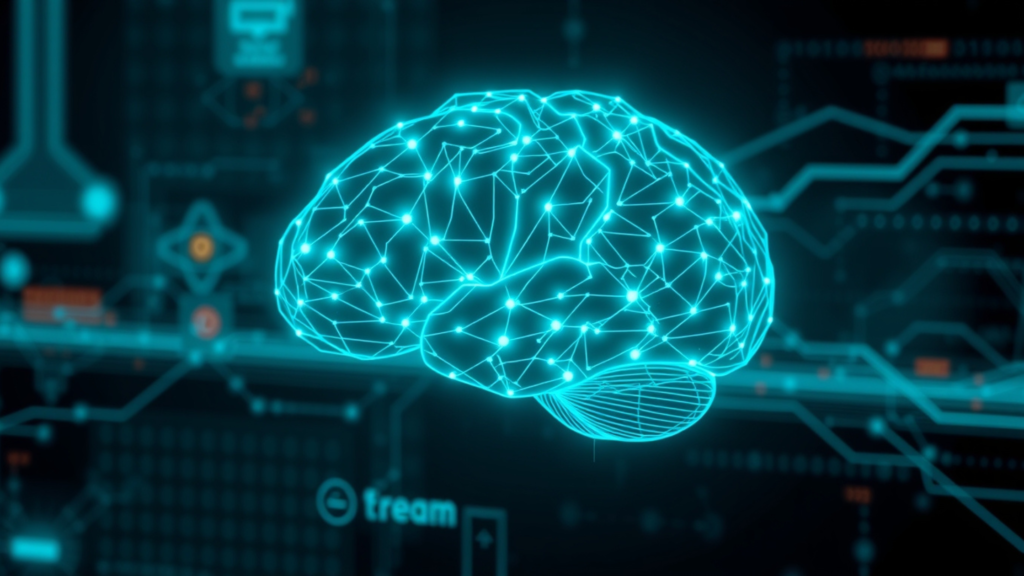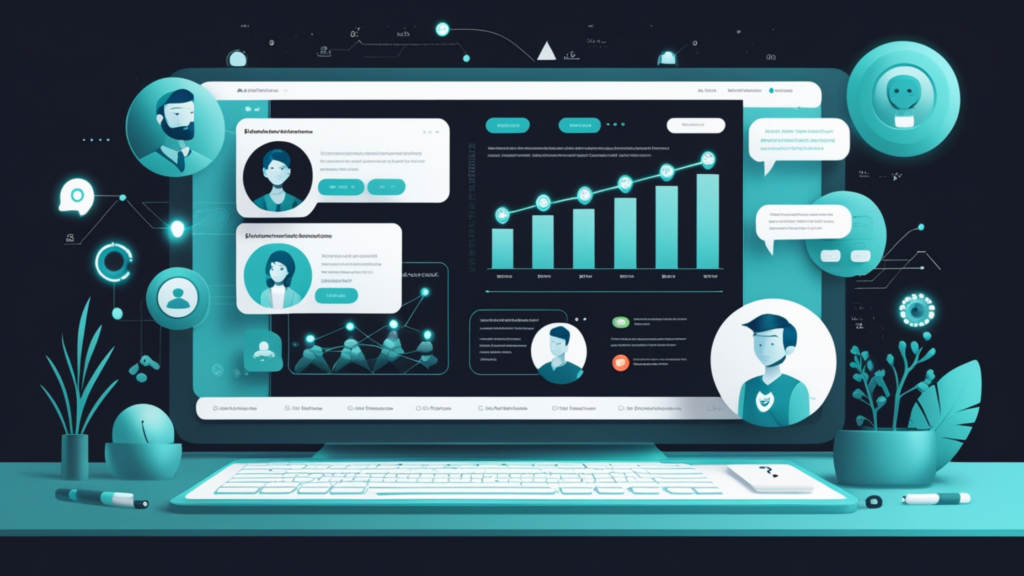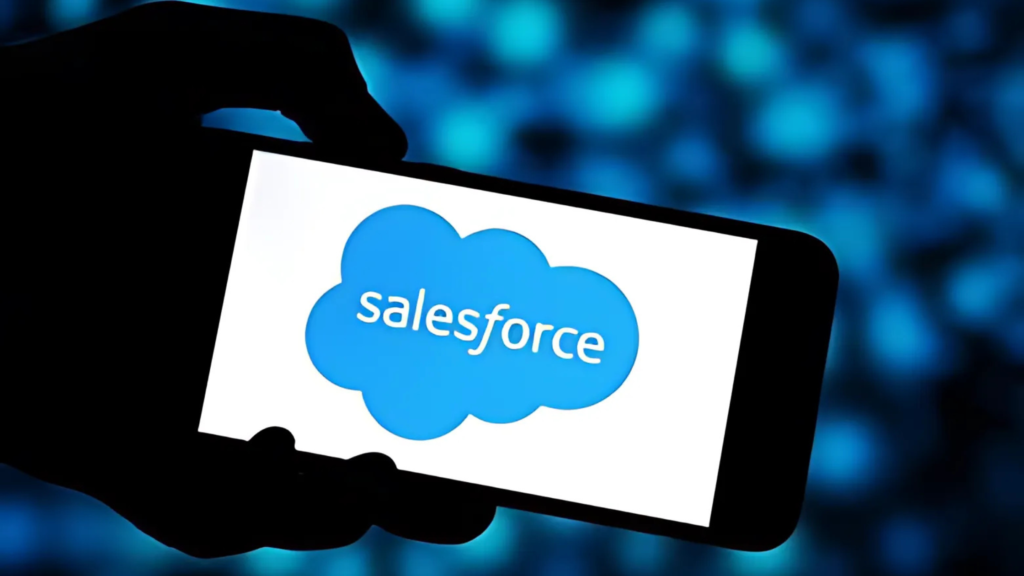AI in Digital Marketing: The Ultimate Guide to Success in 2025

Welcome to the exciting world of AI in digital marketing, where technology meets creativity to redefine the ways we connect with audiences across the globe. In 2025, the use of artificial intelligence (AI) in digital marketing isn’t just an option; it’s essential.
This guide will explore how AI is shaping the marketing landscape, providing tools and strategies that are not only innovative but also indispensable for success.
What is AI in Digital Marketing?
Artificial Intelligence (AI) in digital marketing is transforming how brands interact with their audiences through automation and data-driven insights. It encompasses a range of advanced technologies each designed to optimize different aspects of marketing strategies. Here’s a deeper look at how each technology plays a crucial role:

Machine Learning (ML)
Machine Learning is a subset of AI that enables systems to learn from data, identify patterns, and make decisions with minimal human intervention. In the context of digital marketing, ML is used to:
- Optimize Marketing Campaigns: By analyzing past campaign data, ML algorithms can predict what changes might improve performance in future campaigns.
- Customer Segmentation: ML sorts through customer data to identify distinct groups based on behavior and preferences, allowing for more targeted marketing strategies.
- Dynamic Pricing: E-commerce sites use ML to adjust prices in real-time based on demand, competition, and customer behavior.
Natural Language Processing (NLP)
Natural Language Processing allows computers to process and understand human language, making it possible for machines to perform tasks such as:
- Content Generation: NLP can help generate new content or tweak existing content to better suit target audiences, improving engagement rates.
- Chatbots and Virtual Assistants: These tools use NLP to converse with users in a natural way, providing support and enhancing customer service.
- Sentiment Analysis: This involves analyzing comments, reviews, and posts on social media to gauge public sentiment, helping brands adjust their strategies accordingly.
“The true power of AI is its ability to analyze vast amounts of data and deliver hyper-personalized experiences at scale,” says Neil Patel, digital marketing expert.
Predictive Analytics
Predictive analytics uses statistical algorithms and machine learning techniques to identify the likelihood of future outcomes based on historical data. It’s beneficial in digital marketing for:
- Predicting Customer Behavior: Analyzing past buying patterns to predict future purchases and improve stock management.
- Personalization: Crafting personalized marketing messages based on predicted customer preferences increases relevancy and engagement.
- Lead Scoring: Predictive analytics can rank prospects according to their likelihood of converting, helping sales teams prioritize their efforts.
Together, these technologies enable marketers to process vast amounts of data, uncovering patterns and insights that lead to more effective decision-making and personalized customer interactions.
By 2025, more marketers will be relying on AI tools, with usage rising to 77% from 57% in 2023. This steady growth shows that businesses are seeing real value in AI and how it helps improve marketing efforts.
Benefits of AI in Digital Marketing
Integrating AI into digital marketing strategies revolutionizes how businesses interact with customers, streamline operations, and leverage data for decision-making. Here’s an in-depth exploration of each major benefit:

Enhanced Personalization
AI’s capability to sift through vast datasets enables brands to create highly personalized customer experiences. Personalization goes beyond merely addressing a customer by name:
- Content Customization: AI analyzes user preferences, past behaviors, and engagement history to tailor content that resonates with each individual, increasing the relevance of marketing messages.
- Product Recommendations: E-commerce platforms like Amazon use AI to analyze browsing and purchasing histories, suggesting items that customers are more likely to buy, which enhances the shopping experience and increases sales.
- Personalized Email Marketing: AI segments email lists accurately and crafts messages tailored to the recipient’s interests and past interactions, which can significantly improve open and click-through rates.
“AI-powered personalization isn’t just about recommendations—it’s about creating an emotional connection with customers,” says Brian Solis, digital analyst.
Improved Customer Engagement
AI enhances how brands engage with their customers, making interactions more timely, relevant, and helpful:
- Chatbots and Virtual Assistants: These AI-powered tools provide 24/7 customer service, handling inquiries and resolving issues quickly. They can manage multiple interactions simultaneously, ensuring no customer query goes unanswered.
- Social Media Monitoring: AI tools analyze social media traffic to identify trends and sentiment in real time, enabling brands to engage actively with their audience and manage their online reputation effectively.
- Real-Time Interaction Management: AI can trigger contextually relevant interactions based on user behavior on a website, such as offering a discount when a user appears to hesitate in completing a purchase.
“AI chatbots can now provide 24/7 real-time engagement without losing the human touch,” says Blake Morgan, customer experience futurist.
Data-Driven Insights
AI transforms raw data into actionable insights, helping marketers make informed decisions:
- Market Trend Analysis: AI tools identify trends from both structured data (sales figures, website traffic) and unstructured data (social media posts, customer reviews), providing a comprehensive view of market dynamics.
- Customer Journey Mapping: By tracking customer interactions across different touchpoints, AI helps marketers create detailed customer journey maps. These maps reveal critical decision points in the buying process and areas where interventions can maximize conversions.
- ROI Measurement: AI quantifies the effectiveness of different marketing campaigns in real-time, adjusting strategies dynamically to improve return on investment.
“AI doesn’t just provide data—it transforms data into actionable insights that fuel growth,” says Rand Fishkin, founder of Moz.
Increased Efficiency and Automation
AI automates complex and repetitive tasks, allowing marketing teams to focus on creative and strategic challenges:
- Campaign Automation: AI automates the delivery of campaigns across multiple channels, ensuring messages are sent at the optimal time to the right audience, increasing campaign effectiveness.
- Content Generation: Tools like Jasper AI assist in generating high-quality content quickly, from blog posts to advertising copy, maintaining brand voice, and adhering to SEO best practices.
- Workflow Optimization: AI streamlines workflows by prioritizing tasks, scheduling projects, and integrating data across platforms, reducing manual effort and minimizing the risk of human error.
“AI allows marketers to focus on strategy while automation handles repetitive tasks,” says Ann Handley, Chief Content Officer at MarketingProfs.
Dynamic Pricing
AI’s ability to analyze multiple variables in real time allows businesses to adopt dynamic pricing strategies that reflect current market conditions:
- Demand Forecasting: AI predicts changes in demand based on factors like seasonality, market trends, and consumer behavior, allowing businesses to adjust prices proactively.
- Competitive Pricing: AI continuously monitors competitors’ pricing and automatically adjusts prices to stay competitive without sacrificing profit margins.
- Price Optimization for Profitability: AI models simulate different pricing scenarios to find the sweet spot that maximizes both sales volume and profit margins.
“AI-driven pricing ensures businesses maximize revenue while staying competitive,” says Scott Galloway, business professor at NYU Stern.
These benefits highlight AI’s transformative impact on digital marketing, providing a blend of enhanced customer experiences, operational efficiencies, and deep data insights that drive strategic decision-making and sustainable business growth.
Best AI Digital Marketing Tools

As the digital marketing landscape becomes increasingly complex, AI tools offer sophisticated solutions that enhance efficiency, effectiveness, and personalization. Below is a detailed overview of some of the top AI digital marketing tools that are shaping the industry in 2025:
“AI content tools are the future, but human creativity still plays a vital role in differentiation,” says Joe Pulizzi, founder of Content Marketing Institute.
HubSpot
HubSpot is renowned for its comprehensive suite of AI-powered features across marketing, sales, and customer service. It uses AI to streamline inbound marketing strategies, enabling businesses to attract, engage, and delight customers more effectively.
- Lead Scoring: AI algorithms analyze lead behavior and demographic information to prioritize leads based on their likelihood to convert.
- Email Marketing Optimization: AI tests different variations of email content to determine what performs best with different segments of your audience.
- Chatbots: These provide instant responses to customer queries on your website, improving user experience and engagement.
Jasper AI
Jasper AI specializes in content creation, helping brands produce high-quality written content efficiently. Its capabilities are essential for content marketing strategies focused on scale and speed.
- Automated Content Creation: Generates blog posts, social media content, and marketing copy using natural language processing.
- SEO Enhancement: Integrates current SEO best practices into content creation to improve search rankings.
- Language Adaptability: Supports multiple languages, allowing for localized content creation at scale.
Grammarly
Grammarly is an indispensable tool for content marketers, enhancing writing quality through advanced AI-driven corrections and suggestions.
- Real-Time Grammar and Style Checking: Provides suggestions to improve clarity, correctness, and conciseness in writing.
- Tone Detection: Helps writers match the tone of their content with the intended audience, ensuring communications are always on-brand.
- Plagiarism Checker: Ensures content originality by checking texts against billions of web pages.
Surfer SEO
Surfer SEO optimizes web content with AI to ensure it meets the highest SEO standards, helping pages rank higher in search engine results.
- Content Editor: Provides real-time suggestions for keyword density, structure, and other SEO factors to optimize articles before publication.
- SERP Analyzer: Analyzes top-performing search engine results pages and provides insights based on what’s currently successful in your industry.
- Keyword Research Tool: Identifies high-value keywords and analyzes their potential impact on your content strategy.
Drift
Drift employs AI to enhance customer communication through personalized chatbot interactions, improving conversion rates and customer satisfaction.
- Lead Qualification: Uses AI to interact with visitors, qualify leads, and route them to the appropriate sales team.
- Appointment Scheduling: Automates booking meetings without human intervention, syncing with sales calendars in real-time.
- Personalized Recommendations: Offers product recommendations based on the visitor’s engagement history.
Sprout Social
Sprout Social uses AI to refine social media management, offering tools that help businesses grow their presence and engage effectively with their audience.
- Optimal Post Timing: AI analyzes engagement data to determine the best times for posting content across different platforms.
- Audience Segmentation: Segment followers based on behavior and demographics, tailoring content to different audience groups.
- Sentiment Analysis: Monitors social conversations to gauge brand sentiment, providing insights into public perception.
Salesforce Einstein
Salesforce Einstein seamlessly integrates AI into customer relationship management, enhancing every facet of the customer journey.
- Predictive Insights: Provides sales teams with predictions about customer needs and future behaviors.
- Automated Task Management: Prioritizes tasks and suggests next steps for sales representatives.
- Email and Calendar Sync: Uses AI to analyze calendars and emails to suggest the best times for follow-ups and appointments.
Canva
Canva leverages AI to simplify and enhance the design process, making professional-quality design accessible to everyone.
- Design Suggestions: Offers layout and design recommendations based on the content and context of the project.
- Image Enhancements: Automatically adjusts images to look their best with filters and corrections suggested by AI.
- Logo and Brand Kit Creation: Generates logos and brand materials based on user input about brand identity.
Zapier
Zapier excels in workflow automation by connecting apps and services, enabling marketers to create efficient processes without manual intervention.
- Automated Workflows: Connects your favorite apps to automate repetitive tasks, from simple integrations like syncing files to complex operations like CRM updates.
- Conditional Logic: Creates multi-step workflows that include conditional branches, ensuring tasks are executed based on specific triggers.
- App Integration: Offers integration with over 3,000 apps, allowing users to automate virtually any aspect of their digital marketing operations.
These AI tools represent the cutting edge of technology in digital marketing, each offering unique benefits that can transform how companies approach their marketing strategies, from content creation to customer relationship management.
AI in Digital Marketing Examples

To better understand the practical implications of AI in digital marketing, here are some expanded examples from leading companies that have successfully integrated AI technologies into their marketing strategies:
“The brands that use AI to refine customer experiences will dominate the future,” says Gary Vaynerchuk, marketing entrepreneur.
Salesforce’s Einstein GPT

Salesforce has transformed customer relationship management with Einstein GPT, an AI-powered tool that automates content creation for customer interactions, sales emails, and service engagements. This platform uses natural language processing to generate human-like text, providing personalized communication at scale. For instance, a company using Einstein GPT can automatically send tailored follow-up emails to customers based on their interaction history, significantly increasing engagement rates and customer satisfaction.
- Outcome: Companies using Einstein GPT report a 25% increase in sales lead conversions due to more timely and relevant interactions.
Amazon’s AI Recommendations

Amazon’s recommendation system is perhaps one of the most well-known applications of AI in e-commerce. By analyzing customer purchase history, browsing patterns, and product relationships, Amazon’s AI algorithms suggest items that shoppers are likely to buy next. This not only enhances the shopping experience but also increases the average order value.
- Outcome: AI recommendations contribute to approximately 35% of Amazon’s total sales, showcasing the powerful impact of personalized marketing.
Coca-Cola’s AI Contest

Coca-Cola utilized AI to foster creativity and engagement in the “Create Real Magic” contest, inviting digital artists to use AI tools like DALL-E to generate innovative advertising material. This initiative not only promoted brand interaction but also demonstrated Coca-Cola’s commitment to modern marketing techniques.
- Outcome: The contest saw a 50% increase in user-generated content and social media engagement, broadening the brand’s reach and deepening consumer loyalty.
Nike’s Predictive Analytics

Nike employs AI-driven predictive analytics to tailor its marketing efforts and product developments. By analyzing data on consumer trends, purchase patterns, and social media sentiment, Nike can predict which product features or designs will resonate with its target audience, leading to more successful product launches.
- Outcome: Predictive insights have led to a 20% reduction in stock surpluses and a 15% increase in customer satisfaction with product offerings.
Starbucks’ Deep Brew

Starbucks’ Deep Brew program leverages AI to optimize various aspects of its operations and customer service. The AI system manages inventory, staff scheduling, and even customer orders through predictive analytics, ensuring efficiency and customer satisfaction. Additionally, Deep Brew personalizes marketing messages based on customer preferences identified through their purchasing habits.
- Outcome: The implementation of Deep Brew has resulted in a 10% increase in store efficiency and a significant improvement in customer wait times.
Airbnb’s Dynamic Pricing

Airbnb uses AI to help hosts optimize their pricing strategies dynamically. The platform analyzes multiple factors including past booking data, seasonal demand, and local events to recommend pricing adjustments that maximize earnings without deterring potential guests.
- Outcome: Hosts using Airbnb’s dynamic pricing tool see an average increase of 40% in their rental income compared to static pricing models.
Spotify’s Personalized Playlists

Spotify’s use of AI to curate personalized playlists exemplifies AI’s role in enhancing user experience. By analyzing millions of data points around listening habits, genre preferences, and contextual factors, Spotify’s AI creates unique playlists that keep users engaged and listening longer.
- Outcome: Personalized playlists have increased user engagement by over 30%, contributing significantly to Spotify’s high retention rates.
These examples illustrate not only the diverse applications of AI in digital marketing but also the tangible benefits AI can deliver across different industries and customer interactions. Each case demonstrates how AI enhances the understanding of consumer behaviors and preferences, allowing for more effective and targeted marketing efforts.
How to Use AI in Digital Marketing

Implementing AI in digital marketing can significantly enhance your marketing strategies, making them more effective and efficient. Below, we expand on the steps necessary to effectively integrate AI into your marketing efforts, ensuring that each stage contributes to achieving your business objectives.
“The secret to AI success is integration, not isolation,” says Seth Godin, marketing expert.
Define Clear Objectives
Before integrating AI, it is crucial to have a clear understanding of what you want to achieve. Objectives can range from increasing customer engagement and improving conversion rates to streamlining content creation and optimizing your marketing budget. Specific goals might include:
- Enhancing customer segmentation to deliver more personalized marketing messages.
- Automating customer service responses to improve response times and customer satisfaction.
- Increasing the efficiency of ad spend through better targeting and optimization.
Setting clear, measurable goals helps to focus your AI initiatives and provides a benchmark against which to measure success.
Prioritize Data Quality
The effectiveness of AI largely depends on the quality of the data it processes. Poor data can lead to inaccurate insights and ineffective marketing actions. To ensure your data is ready for AI, consider the following:
- Data Cleaning: Regularly clean your data to remove inaccuracies, duplicates, and irrelevant information, which can skew AI outputs.
- Data Integration: Consolidate data from various sources to create a comprehensive view of your customers. This might include integrating CRM data, social media interactions, transaction histories, and website analytics.
- Data Protection: Implement robust security measures to protect data integrity and privacy, ensuring compliance with relevant regulations like GDPR.
Choose the Right Tools
Selecting the right AI tools is crucial for meeting your specific marketing objectives. Consider the following when evaluating AI tools:
- Relevance: Ensure the tool fits your specific marketing needs. For example, if content creation is a bottleneck, tools like Jasper AI can automate and streamline content production.
- Scalability: Choose tools that can scale with your business as it grows.
- Integration Capability: The tool should integrate seamlessly with your existing marketing stack to ensure smooth data flows and unified management.
Product demos, free trials, and user reviews can be invaluable in assessing whether a tool is right for your needs.
Integrate AI Seamlessly
Effective integration of AI into your existing systems ensures that you leverage its full potential without disrupting ongoing operations. Integration involves:
- Technical Alignment: Ensure that the AI tools are compatible with your current software and hardware.
- Workflow Integration: Integrate AI tools into your marketing workflows. For example, AI-driven analytics tools should be part of your regular reporting and decision-making processes.
- Employee Training: Equip your team with the necessary skills and knowledge to use AI tools effectively. Ongoing training and support are crucial as AI technologies and marketing practices evolve.
Monitor Performance
Continuously monitoring the performance of your AI tools is essential to understand their impact and optimize their use. This involves:
- Setting KPIs: Establish key performance indicators (KPIs) related to your AI objectives. For instance, if using AI for email marketing, relevant KPIs might include open rates, click-through rates, and conversion rates.
- Regular Reviews: Conduct regular performance reviews to assess whether the AI tools are meeting expected outcomes. Use insights from these reviews to tweak and optimize AI deployments.
- Feedback Loops: Create mechanisms for collecting feedback from users and stakeholders about the AI tools. This feedback can provide valuable insights into how the tools can be improved.
By following these detailed steps, you can ensure that AI tools are effectively incorporated into your digital marketing strategy, driving significant improvements in efficiency, customer engagement, and overall marketing effectiveness.
Pros & Cons of AI Digital Marketing

Utilizing AI in digital marketing offers significant advantages while presenting certain challenges that need thoughtful consideration. Here’s a more in-depth look at the pros and cons:
“The biggest challenge with AI isn’t technology—it’s trust,” says Sheryl Sandberg, former COO of Meta.
| Pros | Cons |
| Personalization at scale | Data privacy concerns |
| Improved customer interaction | Potential reduction in human touch |
| Efficient data analysis | Complexity in integration |
Pros
Personalization at Scale
AI enables marketers to tailor experiences and content to individual users, even when dealing with large customer bases. This not only improves user engagement but also increases the effectiveness of marketing campaigns.
- Dynamic Content Delivery: AI analyzes user behavior in real time to deliver personalized content and offers, enhancing the likelihood of conversion.
- Segmentation: AI algorithms can segment customers more accurately and in more nuanced ways than traditional methods, allowing for highly targeted marketing strategies.
Improved Customer Interaction
AI improves the quality and efficiency of customer interactions, making them more productive and satisfying for both parties.
- 24/7 Customer Service: AI-powered chatbots and virtual assistants can provide round-the-clock customer service, handling inquiries, and resolving issues without human intervention.
- Real-Time Response: AI systems can respond to customer behavior immediately, such as adjusting recommendations or addressing potential issues before they escalate.
Efficient Data Analysis
AI excels at processing large volumes of data quickly and accurately, providing insights that would be impractical to gather manually.
- Predictive Analysis: AI can predict trends and customer behavior, allowing businesses to be proactive rather than reactive.
- Performance Tracking: AI tools continuously analyze the effectiveness of marketing campaigns and adjust strategies based on real-time data.
Cons
Data Privacy Concerns
As AI systems require vast amounts of data to function effectively, they raise concerns about data privacy and security. Handling and storing customer data responsibly is crucial.
- Compliance Risks: Businesses must ensure AI practices comply with all relevant data protection regulations, which can vary significantly across regions.
- Data Breaches: The use of AI increases the risk of data breaches, potentially exposing sensitive customer information.
Potential Reduction in Human Touch
While AI can significantly enhance efficiency, it may also reduce the personal touch that is often crucial in building customer relationships.
- Lack of Empathy: AI cannot fully replicate human empathy and may not handle complex emotional customer interactions well.
- Over-Automation: Excessive reliance on automation can lead to customer frustration, especially if customers feel they are not receiving personalized attention.
Complexity in Integration
Integrating AI into existing marketing systems can be complex and resource-intensive, particularly for businesses without substantial technical capabilities.
- Technical Barriers: The integration of AI may require significant changes to existing IT systems and infrastructure.
- Skill Gaps: There is often a significant skill gap that must be addressed, either through hiring new talent or training existing employees, which can be costly and time-consuming.
Balancing the Pros and Cons
To maximize the benefits of AI in digital marketing while mitigating the downsides, businesses should:
- Enhance Data Security: Implement state-of-the-art security measures and handle customer data transparently, maintaining trust and compliance.
- Maintain Human Oversight: Ensure that AI tools supplement rather than replace human interactions, especially in key customer service roles.
- Simplify Integration: Use modular AI tools that can easily integrate with existing systems, and consider partnerships with AI providers that offer support during integration.
By understanding these pros and cons, marketers can more effectively strategize the integration of AI into their digital marketing efforts, ensuring they leverage the advantages while managing the risks.
Future of AI in Digital Marketing
As we look beyond 2025, the potential for AI in digital marketing continues to evolve, promising transformative changes that could redefine how businesses interact with consumers. Here’s a deeper exploration of what the future holds for AI in this field:
“Marketers who fail to embrace AI will fall behind—it’s that simple,” says Andrew Ng, AI pioneer.

AI as Strategic Partner
AI is expected to transition from a supportive tool to a core component of strategic marketing decision-making. This shift will see AI not only automate tasks but also provide strategic insights that can shape the future of business operations.
- Integrated Decision-Making: AI will analyze data across multiple platforms to provide holistic insights, helping marketers make informed decisions that align with broader business objectives.
- Predictive Strategy Development: Using advanced predictive models, AI will forecast market trends and consumer behavior, allowing companies to adjust their strategies proactively rather than reactively.
Dynamic Content Creation
Content creation driven by AI will become more dynamic and responsive, adapting in real time to the changing preferences and behaviors of consumers.
- Automated Content Optimization: AI will continually analyze user engagement and tweak content in real time to ensure it remains relevant and engaging.
- Context-Aware Content: AI systems will become better at understanding the context of interactions, enabling them to deliver content that is not only personalized but also appropriate for the specific situation or environment.
Ethical AI Use
As AI takes on a more prominent role in digital marketing, ethical considerations will become increasingly important. Companies will need to navigate the fine line between personalization and privacy, ensuring that AI-driven initiatives respect consumer rights and data integrity.
- Transparent Data Usage: Businesses will need to be transparent about how they collect, use, and store consumer data, providing clear options for consumers to control their own information.
- Bias Mitigation: AI systems must be designed to avoid biases that can lead to unfair or unethical outcomes. This includes training AI on diverse data sets and continually auditing its decisions for fairness.
Advanced Personalization
AI will push the boundaries of personalization, using deeper insights to craft marketing messages that resonate on an individual level.
- Emotion Recognition: Future AI tools may use biometric data and emotional recognition technology to understand and respond to the emotional state of consumers, tailoring interactions in a way that is empathetic and effective.
- Anticipatory Personalization: AI might predict a consumer’s needs and provide solutions before the consumer even identifies those needs themselves, enhancing convenience and customer satisfaction.
Seamless Omnichannel Experiences
AI will enable truly seamless omnichannel marketing experiences, where consumers can move effortlessly between devices and platforms without any friction.
- Cross-Platform Data Integration: AI will manage data across all consumer touchpoints, providing a unified view that helps deliver a consistent message across all channels.
- Real-Time Channel Optimization: AI will dynamically determine the most effective channel for reaching a particular consumer at a specific time, maximizing impact and engagement.
Enhancing Creativity
AI’s role in creativity will expand, assisting marketers in generating innovative ideas and solutions that push the boundaries of traditional marketing.
- Creative Design Tools: AI will help in designing marketing materials that are both innovative and optimally aligned with brand messaging.
- Inspiration and Brainstorming: AI tools will suggest concepts and approaches based on emerging trends, helping marketing teams stay ahead of the curve.
How Saletancy Can Help You with Your Marketing Efforts
Saletancy is equipped to amplify your marketing efforts with tailored solutions that precisely meet your business needs. Here’s how they can support your initiatives:

- Customized Marketing Strategies: Saletancy works closely with you to develop unique strategies that target your specific market effectively.
- Enhanced SEO Services: Their team boosts your online visibility by enhancing your website’s search engine rankings, helping you attract more valuable traffic.
- Robust Social Media Management: Saletancy handles your social media profiles, engaging with your audience and building stronger customer relationships through timely and relevant content.
- Efficient Lead Generation: They design targeted campaigns that focus on generating high-quality leads, potentially increasing your conversion rates and boosting sales.
- Creative Content Marketing: Whether it’s blog posts, videos, or infographics, Saletancy crafts compelling content that resonates with your audience, enhancing your brand’s presence and credibility.
- Targeted Email Marketing: Their experts help you create effective email campaigns tailored to keep your customers informed and interested in your offerings, optimizing open and click-through rates.
To see how Saletancy can transform your digital marketing efforts, visit our website here: Digital marketing agency.
Conclusion
AI in digital marketing is not just about adopting new technologies but about transforming how we engage with and understand our customers. As we look to the future, embracing AI is essential for any marketing strategy that aims to be dynamic, responsive, and successful.
FAQs
What is AI in digital marketing?
AI in digital marketing means using smart technology like machine learning, natural language processing, and predictive analytics to make marketing better. AI helps to do jobs automatically, makes experiences personal for customers, understands lots of data, and makes sure marketing efforts are as effective as possible.
How does AI improve customer engagement in digital marketing?
AI makes customer engagement better by providing personalized interactions using chatbots and virtual assistants, adjusting content based on what users do, and giving support and responses right away. This means customers get more relevant and timely help, which makes them happier and more loyal to the brand.
What are the best AI tools for digital marketing in 2025?
In 2025, some top AI tools for digital marketing include HubSpot, which is great for customer relationship management and automating tasks; Jasper AI, which helps create content; Grammarly, which assists in writing better in real-time; Surfer SEO, which improves content for search engines; and Salesforce Einstein, which offers deep customer insights and can predict future trends.
What are the pros and cons of using AI in digital marketing?
Pros:
- AI allows for very personalized marketing.
- It can analyze data quickly and accurately.
- It improves how companies interact with customers.
- It can do routine tasks automatically, making things more efficient.
Cons:
- Using AI can lead to concerns about how safely customer data is kept.
- It might make customer service feel less personal.
- Adding AI into existing systems can be complicated.
How can businesses effectively integrate AI into their digital marketing strategies?
To effectively use AI in digital marketing, businesses should:
- Be clear about what they want to achieve.
- Make sure the data they use is good quality.
- Choose AI tools that fit what they need.
- Add these tools smoothly into what they already have.
- Keep checking how well the AI tools are working and make changes if needed to get better results.
How is AI being used in digital marketing?
AI is being used in digital marketing to make marketing efforts more efficient and personalized. It helps in automating repetitive tasks, analyzing large amounts of data quickly, and making predictions to assist in decision-making. Specific uses include creating personalized content, managing and optimizing advertisements, improving search engine optimization (SEO) with data insights, and providing real-time customer service through chatbots.
How to start AI digital marketing?
To start with AI in digital marketing, follow these steps:
- Identify your needs: Determine what marketing tasks you need help with, such as data analysis, content creation, or customer service.
- Choose the right tools: Select AI tools that meet your needs. Popular options include CRM systems with AI capabilities, AI-based content generators, and marketing automation tools.
- Integrate AI into your systems: Implement these AI tools into your existing marketing processes.
- Train your team: Ensure your marketing team understands how to use these AI tools effectively.
- Monitor and adjust: Keep an eye on the performance of your AI tools and make adjustments to your strategies as needed.
What is the role of AI in digital marketing in 2025?
In 2025, AI plays a crucial role in digital marketing by driving efficiency and innovation. It is heavily used for data analysis, enabling marketers to understand and anticipate customer behavior more accurately. AI also automates complex tasks, personalizes marketing at scale, and improves customer interactions through smarter, more responsive communication tools. This widespread use of AI helps businesses stay competitive in a fast-evolving digital landscape.
Is AI the future of digital marketing?
Yes, AI is widely considered the future of digital marketing. Its ability to analyze data quickly, predict trends, and automate tasks makes marketing more effective and personalized. As technology advances, AI’s role in digital marketing is expected to grow, leading to more sophisticated and intelligent marketing strategies that can meet the needs of businesses and consumers alike.
What type of AI is used in marketing?
Several types of AI are used in marketing, including:
- Machine Learning: Helps predict customer behavior and outcomes based on historical data.
- Natural Language Processing (NLP): Used for creating content, understanding customer sentiments, and powering chatbots.
- Deep Learning: Employs complex neural networks to analyze images and video content for insights and automated decision-making.
- Predictive Analytics: Used to forecast future trends and customer responses. These AI technologies help marketers optimize their strategies, making them more effective at engaging customers and driving sales.